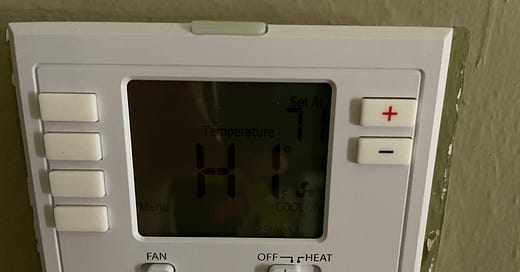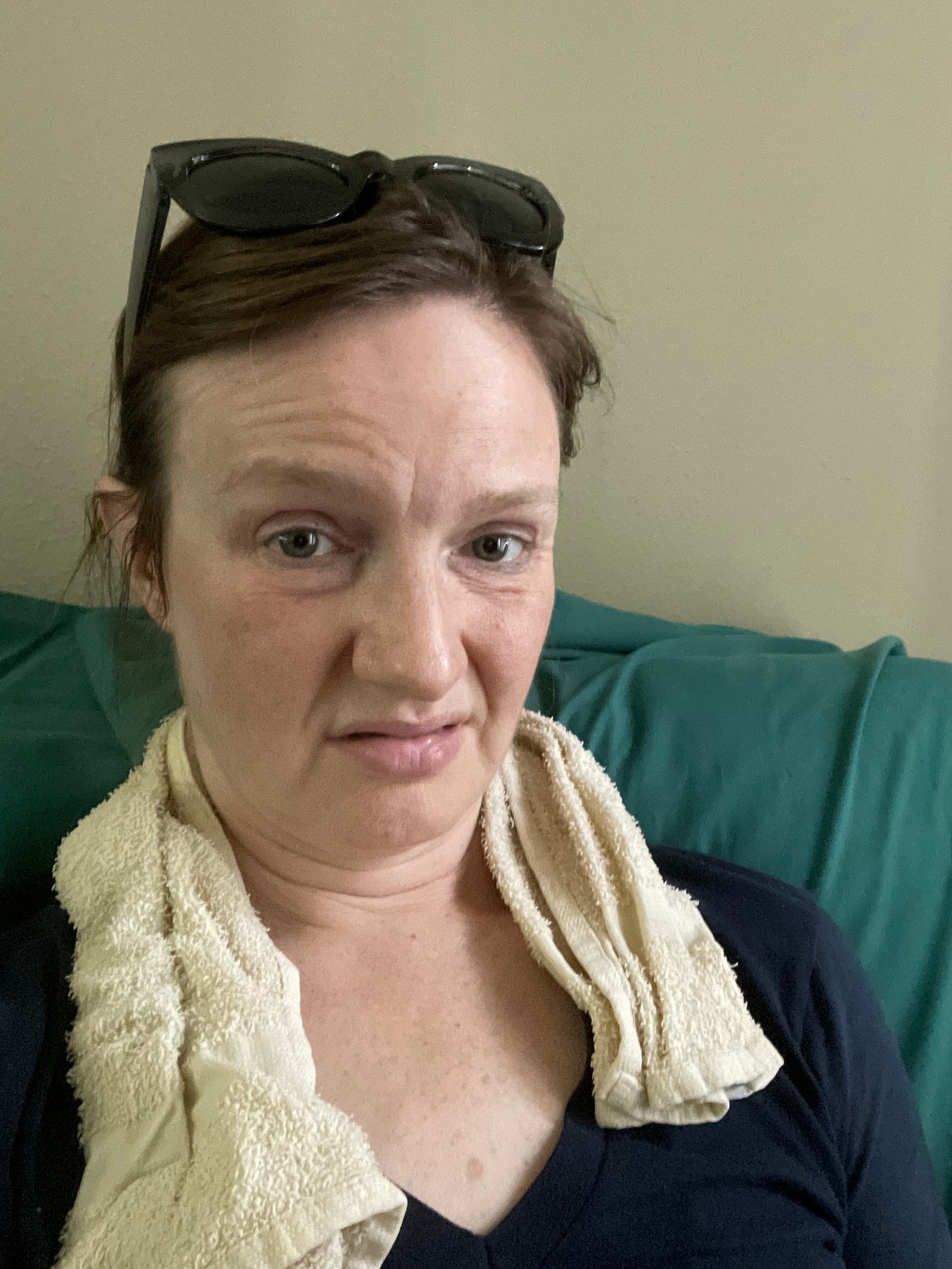I treated the first half of my year-long sabbatical like another job. I spent the first three months in my pandemic bubble doing inner work—reading, learning, chasing sunsets. I dedicated the next two months to volunteering at my local mass vaccination site. Freshly inoculated, I then traveled to both coasts visiting family I’d be away from too long.
Coming into the summer, I set two goals:
Let loose—enjoy a summer of freedom with dancing and loved ones
Oversee a small construction project at my house
I put further sabbatical experiments on hold to have some time to breathe. So I thought.
Well, shit
The construction work quickly went awry. Over-promising led to under-delivering with ghosting, shoddy work, and flat-out lying.
Midway through the project, my air conditioning also stopped working, requiring full replacement. This was unrelated to the other work underway, but intersected with it. The closet housing the old unit wasn’t big enough for newer models. This required busting out a wall, rebuilding the closet, and adding a support beam to the ceiling.
My hot vaxxed sabbatical summer ended up much hotter than I imagined. Summer in Texas is unbearable without air conditioning. I know people lived here before AC was invented. I did not, nor do I wish to. It was 95 degrees Fahrenheit inside the house.
My home was uninhabitable. For 2.5 months, I stayed at my partner’s apartment, going back and forth to check on the work, bring refreshments to the workers, and take care of things around the house.
The lowest point was coming back to do yard work one day, and pouring a bucket of rainwater to water plants only to find out it was…let’s say smelly and covered in flies.
That’s about how my summer went.
Feeling untethered
I felt unsettled, not just because I was living away from home and managing a construction project from hell covered in shit water. My summer of freedom revealed some cracks I’d thus far overlooked.
I was missing a community.
Increased social interactions intensified feelings of being outside societal norms. It felt awkward when anyone asked, “What have you been up to?” I felt guilty that I wasn’t working during a supposed labor shortage. Our world had opened back up, and everything was busy. My roommate was working two jobs in the service industry. My partner and everyone else I knew in the airline industry were completely slammed. Should I re-join the working, or find a group of others on a similar journey?
I was missing a purpose.
The first three chapters of my sabbatical had clear themes: restore, serve, reunite. That summer I took a couple of classes and volunteered occasionally at Meals on Wheels, but felt a bit all over the place. I was wandering aimlessly, but didn’t know how. Could I define a new purpose without launching a career?
I was missing an identity.
Being a leader, an expert, and a problem-solver at work was a huge part of my identity. US culture categorizes people by profession. I cringed when I met a new person who asked, “So, what do you do?” Who was I when I wasn’t working?
Knee-jerk reaction
Despite committing to a year off at the beginning of my sabbatical, I applied to two jobs that summer. I made an excuse that they were both “dream jobs”. One was for an innovative nonprofit, and the other for a learning organization to which I felt deep allegiance.
Both applications were mini-jobs themselves, requiring extensive writing, projects, and multiple recorded or live interview rounds.
Around the same time, I started feeling emotionally off. I felt symptoms of depression—crying for no reason, feeling completely exhausted, moving like I was wearing a lead x-ray protection suit. I couldn’t find the clarity, curiosity, and joy I felt in earlier phases of my time off.
At the last panel interview for the first position, I delicately asked a work-life balance question. The HR panelist admitted she answered emails at midnight and despite offering unlimited PTO, she could see that no one took any. HARD PASS. I decided to decline the position, although they didn’t end up offering.
The second organization made empty vows to do the hiring process differently. They promised transparency and regular updates to all applicants. These quickly dried up. They didn’t announce they filled the role until almost a year later. At least they offered free enrollment in a course as an apology.
In both instances, I came out a winner. Everything in my body was telling me I didn’t want to work, but my brain kept telling me I should be. Immediately after making the decision not to take the first job, I felt relief. The heavy feeling in my body lifted.
I wasn’t ready. A job wasn’t the grounding I needed.
My Conclusion
Coming into my sabbatical, I researched the types of things I wanted to do. I neglected to research the types of things I might experience. It turns out feelings of lost community, purpose, and identity are common during this type of life change. I discovered this a bit later in my time off.
Here are my recommendations for someone contemplating a sabbatical or questioning their relationship with work:
Do some research
Paul Millerd’s The Pathless Path is my #1 recommendation. Paul has been studying and writing about this topic for years. He is also one of the most curious, generous, and humble people I’ve met online.
The Sabbatical Project compiles research and individual people’s stories to guide the sabbatical-curious through the process.
Simone Stolzoff’s The Good Enough Job (now available for pre-order) challenges US notions of work as central to identity. I read an advance copy earlier this month, and recommend it to anyone who feels like they might have an unhealthy relationship with work.
Join a community
After much prodding, Paul Millerd recently started a community called Find the Others. I joined at the start, and found it full of lovely people on similar wandering paths. This community encouraged me to start publishing this newsletter.
Taking a cohort-based course online is a great way to meet curious people with a growth mindset. I took an online writing class in 2021 and still meet weekly with my accountability partner. Especially for someone who has made most of their adult friends through their workplace, it’s a good way to meet people with different life narratives.
Doing more research beforehand may have prevented some of my sabbatical summer heartache. Knowing what to expect and talking to others in similar spots can make a huge difference.
If you are thinking about making a change, I’m here for you.








I really appreciate you sharing this! One, things go wrong, even when you’re on a sabbatical. Sometimes I think the universe does it on purpose but that’s a new working theory. Two, the identity crisis I’m also starting to think is normal. I had made the decision to actively not interview when I left corporate, which ended up being a good thing because like you said, the job market was hot and I was surprised at how many opportunities came my way. Sometimes with friends who I truly wanted to help, even though I didn’t want to really get back into work. I found myself doing free “consulting” because I’d rather do that for an hour and give them support instead of taking on a whole job. Really interesting to read Claire! I feel like you have a really interesting book on you.
Claire, I absolutely love reading your Stumbling Towards Clarity. I thought I knew all that was going on in your life, since I’m your mom and see you nearly weekly. It’s been a revelation to see into all you were and are experiencing as the amazing woman you are. You also give excellent advice. I love you.